Tavan Tolgoi
Tavan Tolgoi (Mongolian: Таван толгой, also Tavantolgoi, Tavantolgoy, "Five Hill") is one of the world's largest untapped coking and thermal coal deposits, located in the Ömnögovi Province in southern Mongolia.[1] It has a total estimated resource of 6.4 billion tonnes, one quarter of which is high quality coking coal. It is divided into six sections: Tsankhi, Ukhaa Khudag, Bor tolgoi, Borteeg, and Southwest and Eastern coalfields.[2] The Tsankhi section is the largest part, and is divided into East and West Tsankhi - these have had the most focus recently.
| Location | |
|---|---|
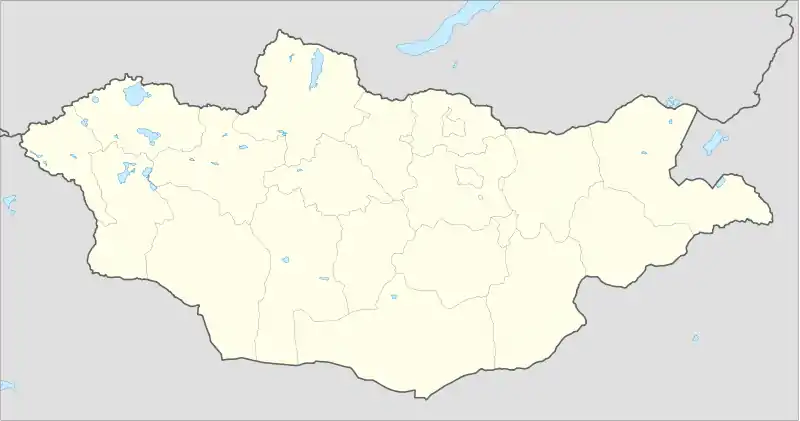 Tavan Tolgoi | |
| Location | Tsogttsetsii sum |
| Aimag | Ömnögovi |
| Country | Mongolia |
| Coordinates | 43°37′30″N 105°28′27″E |
| Production | |
| Products | Coking coal |
| Owner | |
| Company | Erdenes MGL |
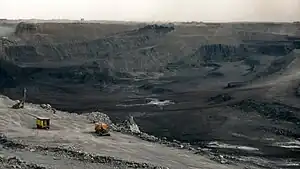
All of Tavan Tolgoi is owned by Erdenes MGL (a government owned company) except for Ukhaa Khudag section which is mined by the Mongolian Mining Corporation.[3] Erdenes Tavan Tolgoi JSC (Erdenes TT), a subsidiary of Erdenes MGL, is managing the development of East Tsankhi, and the company is due to float on the Hong Kong, London and Ulaanbaatar stock markets in late 2012.[4] Mining of West Tsankhi is planned to be contracted to a consortium of international mining companies – a decision is due in late 2012.[5]
Tavan Tolgoi is situated in the southern Gobi Desert. Tavan Tolgoi is 15 km SW from Tsogttsetsii sum center, 98 km E from Ömnögovi Province center Dalandzadgad. It is 150 km from Oyu Tolgoi and about 240 km north of the Chinese border.
History
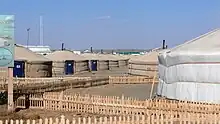
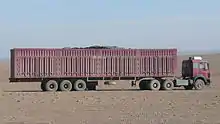
The Tavan Talgoi deposit was discovered by a Soviet exploration team that included the first Mongolian geologist Jaltsavyn Dugersuren in 1945, and exploratory drilling and feasibility studies continued until 1985.[6] After Mongolia's democratic transition in 1990/91, the government allowed foreign companies to explore the deposit. BHP gained the exploratory rights in the early 1990s; however, they relinquished the rights in the mid-1990s because of financial concerns.[7][8] In 2006, the government awarded Energy Resources LLC the mining license over the Ukhaa Khudag section (license MV-11952).[9] The government also amended the Minerals Law in 2006 and identified 15 strategic deposits (allowing the government greater ownership of mines), of which Tavan Tolgoi was one.[10]
In 2007, the government decided to review the ownership and investment rights over Tavan Tolgoi, and the prime minister (Bayar Sanjaa) proposed to renationalise the deposit - the government would gain 50%, Energy Resources keeping 14% and other investors the remaining 36%.[11] Erdenes MGL LLC was formed as a wholly government-owned company in 2007, and later that year the government renationalised Tavan Tolgoi, leaving Energy Resources with the Ukhaa Khudag section.[12] The government began negotiations in 2009 with mining companies to give them a 48% stake in Tavan Tolgoi. BHP was initially interested in, but in early 2009 withdrew its bid.[13] After this, Peabody Energy (an American mining company) reportedly approached the government interested in the deposit.[13]
In 2010, the Erdenes MGL LLC formed a new company - Erdenes Tavan Tolgoi - which would hold the licenses and manage the Tavan Tolgoi deposit. In July 2010 it was reported that the government had decided to sell 30% of Erdenes TT, keep 40%, give 10% to Mongolian citizens and 20% to Mongolian companies.[14] However, in 2011 the government announced plans for an IPO of 29% of Erdenes TT, and to continue to give 10% of the shares to citizens and reduce from 20% to 10% the amount given to Mongolian companies, with the government to hold the remaining 51%.[10] The money raised from the IPO would be used to fund the development of East Tsankhi, while West Tsankhi would be sold to a mining consortia.
Sections
East and West Tsankhi
The Tsankhi section is the largest in the Tavan Tolgoi deposit, and there are plans to develop both East and West Tsankhi, although both developments have been surrounded by confusion and delays.
There is often a misunderstanding that the title ‘Tavan Tolgoi’ refers to the Erdenes Tavan Tolgoi development in Tsankhi, since this is the largest and highest profile area in the entire coal deposit; however Tavan Tolgoi covers a much larger area.
West Tsankhi
The West Tsankhi section of the Tavan Tolgoi coal deposit has been in operation since 1967, as a small coal mine. It supplied coal to the Mongolian domestic market, but in August 2011, started exporting coal to China [15] In 2009 in order to maximize the mine's production, the Mongolian government put the mine up for international companies and consortia.[16] Six companies were shortlisted – Shenhua Group, ArcelorMittal, Kores, Peabody Energy, Vale S.A., Xstrata among others. In July 2011 it was reported that the government had awarded the contract to mine West Tsankhi to China's Shenhua Group, a Russian-led consortium, and US miner Peabody Energy Corporation. However, in August, officials said that no decision had been finalised, and now a final decision on it is not due until later in 2012. Recently, Dr Graeme Hancock (COO of ETT) cited the difficulty in managing the multiple companies interested in the consortium.[17]
East Tsankhi
The East Tsankhi section is fully owned by Erdenes Tavan Tolgoi, who chose the Macmahon Holdings and BBM Operta joint venture to mine the site.[18][19] The contract is for five years, from 2012-2017 and is worth US$500 million.[20] Production from the mine is expected to be 3 million tonnes in 2012 and reaching a maximum production of 15 million tonnes per year once the mine and its associated infrastructure is built, with a total value over five years of US$2 billion.[18][19] In September 2012 it was reported that the mine was on track to extract 3.5 million tonnes of coal [21]
In 2010 the Mongolian government decided on a plan to float 30% of Erdenes TT in an IPO on the Hong Kong, London and Ulaanbaatar stock exchanges; however this was later reduced to 20% in January 2012.[22] The IPO was intended to occur in 2011, but was postponed to late 2012 or early 2013.[23] In addition, 10% of the Erdenes TT will be sold to local companies, 10% will be distributed in shares to every Mongolian citizen, and the government will retain the remaining share in the company. There is speculation that the Hong Kong listing may be dropped, but this has been denied by the company [24][25]
Ukhaa Khudag
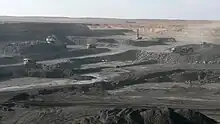
The Ukhaa Khudag section of Tavan Tolgoi deposit covers an area of 2,960 ha and has reserves of 581 million tonnes.[3][26] It is owned and mined by the Mongolian Mining Corporation (formerly Energy Resources LLC); they were granted a mining license in August 2006, and began mining in April 2009.[9] MMC has contracted Leighton Asia to conduct mining operations at the site.[27] Production at the mine has increased to 2.1 million tonnes in the first quarter of 2012.[28] MMC constructed a road from Ukhaa Khudag to the Gashuun Sukhait border crossing (finished in October 2011). The road charges other mining companies a fee for use - there are now concerns that trucks are avoiding the toll and driving parallel to it, causing erosion and pollution issues.[29]
In 2012, MMC announced plans to construct a railway from Ukhaa Khudag to the Gashuun Sukhait border crossing, to be completed in 2015.[30] While that particular plan apparently did not come to fruition, the railway along the same or similar route was said to be under construction as of 2014, with the estimated completion date in late 2016. A special vote of the Mongolian Parliament made it possible to construct this railway on the 1435 mm standard gauge (for a seamless connection with China's railway network), rather than on the 1520 mm Russian gauge used elsewhere in Mongolia.[31]
The construction of the new railway networks linking coal mines in southern Mongolia with northern China is expected to be completed in the second half of 2022.[32] The 233-km long railway from Tavan Tolgoi to Gashuunsukhait border port came online on September 9, 2022.[33]
References
- "Booming Mongolia: Mine, all mine". The Economist. 21 January 2012. Retrieved 22 January 2012.
- Erdenepurev, A. "Brief update on Tavan Tolgoi coal project Mongolia" (PDF). UNESCAP. Retrieved 17 September 2012.
- "Ukhaa Khudag mine". Mongolian Mining Corporation. Retrieved 18 September 2012.
- Hook, Leslie (8 March 2012). "Huge Mongolian mining float delayed". Financial Times. Retrieved 18 September 2012.
- Batkhuyag, Badrakh (3 July 2012). "Mongolia President Sets 2012 Deadline for Picking Tavantolgoi Partners". Business Mongolia. Archived from the original on July 8, 2012. Retrieved 18 September 2012.
{{cite news}}: CS1 maint: unfit URL (link) - "Mongolia Energy Sector Review" (PDF). World Bank. 25 November 1995. Retrieved 19 September 2012.
- Michael Sainsbury, "Mongolia heats up the market for coal exports", The Australian, September 09, 2010.
- John Garnaut, "Mongolia gears up for mining bonanza", Sydney Morning Herald, February 21, 2011.
- Energy Resources LLC, "About Us: Company Overview", Energy Resources LLC website, accessed March 2011.
- Barreto, Elzio. "IPO for Tavan Tolgoi expected by end 2011, early 2012" (PDF). Resource Investment Capital. Retrieved 18 September 2012.
- "Mongolia to Reconsider Plans for Tavan Tolgoi Coking Coal Project", Mining Top News, November 28th 2007. (This was an Associated Press story).
- Ariunbold Altankhuyag, "New Mongolian Government Announces Seizure of Tavan Tolgoi" Mongolia Web, December 19, 2007.
- "BHP withdraws offer to mine Tavan Talgoi". Mongolia web. 23 January 2009. Retrieved 19 September 2012.
- John Duce, 'Mongolia Plans to Offer 30% Tavan Tolgoi Company (Update1)", Bloomberg, July 8, 2010.
- "Erdenes Tavan Tolgoi started its first operation to export coal". Info Mongolia. Retrieved 17 September 2012.
- Amarsanaa (28 October 2009). "7 foreign companies were named to cooperate on Tavan Tolgoi". Business Mongolia. Archived from the original on October 6, 2011. Retrieved 18 September 2012.
{{cite news}}: CS1 maint: unfit URL (link) - Batkhuyag, Badrakh. "Mongolia struggles to find the right investors for Tavan Tolgoi". Business Mongolia. Archived from the original on April 26, 2012. Retrieved 8 November 2012.
{{cite web}}: CS1 maint: unfit URL (link) - "Tavan Tolgoi". MacMahon Holdings. Retrieved 18 September 2012.
- "News 27/9/2011". BBM Group. Retrieved 18 September 2012.
- Batkhuyag, Badrakh (17 October 2011). "Australian company wins USD 500 million Tavantolgoi contract". Business-Mongolia.com. Archived from the original on January 18, 2013. Retrieved 18 September 2012.
{{cite news}}: CS1 maint: unfit URL (link) - "Erdenes Tavan Tolgoi to extract 3.5 million ton of coking coal in 2012". Info Mongolia. 18 September 2012. Retrieved 18 September 2012.
- "B. Enebish: The Delaying of Tavan Tolgoi's IPO is Helping Increase Its Value". UB Post. 11 May 2012. Retrieved 18 September 2012.
- Tudor, Alison (25 February 2011). "Mongolia Picks Four Banks for Coal IPO". Wall Street Journal. Retrieved 18 September 2012.
- Batkhuyag, Badrakh (14 January 2012). "Mongolia coal mine drops HK from IPO for now-sources". Business Mongolia. Archived from the original on January 16, 2012. Retrieved 18 September 2012.
{{cite news}}: CS1 maint: unfit URL (link) - Batkhuyag, Badrakh (9 March 2012). "Mongolia Delays $3 Billion Coal IPO to Retain Hong Kong Plan". Business Mongolia. Archived from the original on June 8, 2012. Retrieved 18 September 2012.
{{cite news}}: CS1 maint: unfit URL (link) - "Mongolia 101" (PDF). Resource Investment Capital. Retrieved 8 November 2012.
- "Projects: Ukhaa Khudag Coal Mine". Leighton Holdings. Retrieved 8 November 2012.
- "MMC: Interim Results 2012" (PDF). MMC. Retrieved 8 November 2012.
- Jacob, Pearly. "Mongolia: Environment Pays Price for Infrastructure Inefficiencies". Eurasianet. Retrieved 8 November 2012.
- "Rail Project". MMC. Retrieved 8 November 2012.
- Kohn, Michael (2014-10-24). "Mongolia Embraces China With Compatible Rail to Cut Costs".
- Adiya, Amar (2022-05-25). "What You Need To Know About Mongolia and What's On the Horizon in H2 2022". Mongolia Weekly. Retrieved 2022-05-27.
- Adiya, Amar (2022-09-08). "New Coal Rail Network Comes Online Connecting Mongolia With China". Mongolia Weekly. Retrieved 2022-09-11.